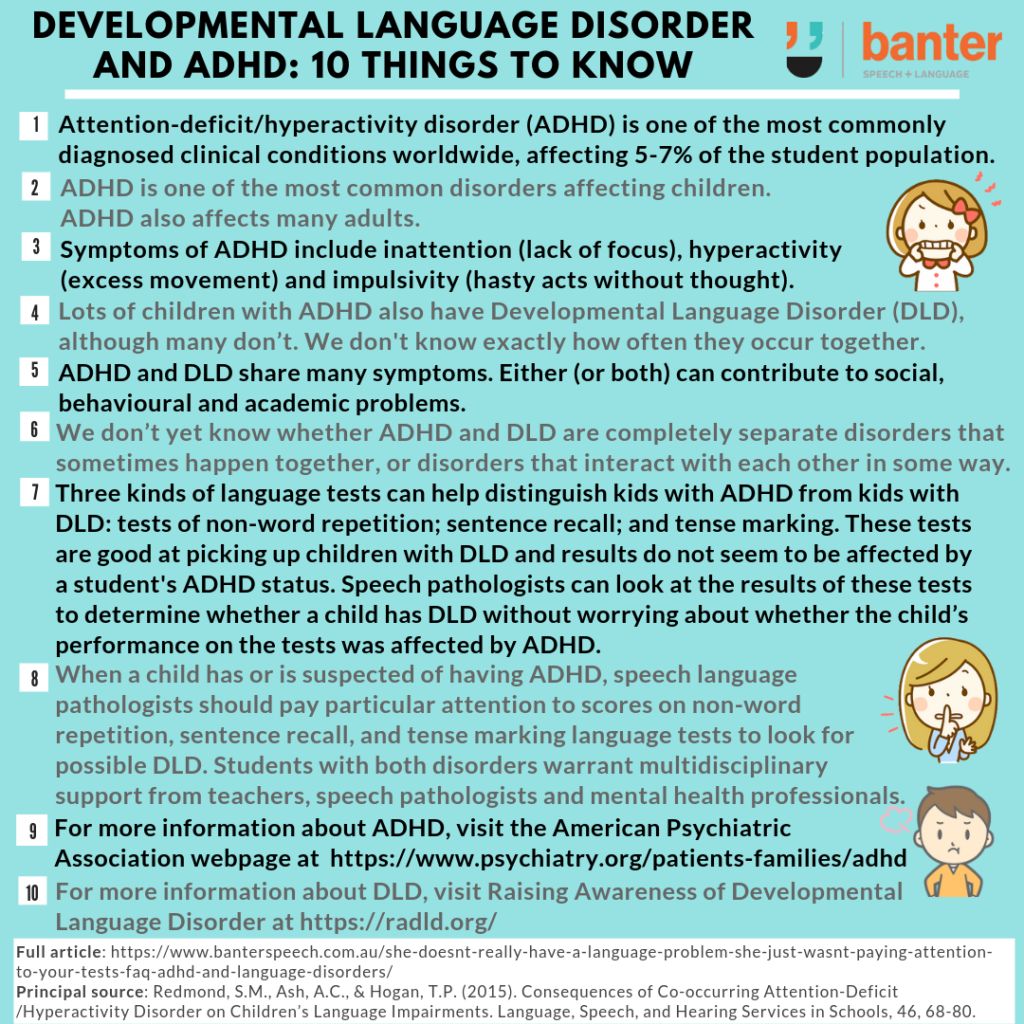“She doesn’t really have a language problem. She just wasn’t paying attention to your tests”. FAQ: ADHD and language disorders
When assessing a child with ADHD for a language impairment, what should we do to be confident about the results of our language tests?
ADHD and language disorders often co-occur
Attention-deficit/hyperactivity disorder* (ADHD) is one of the most commonly diagnosed clinical conditions worldwide, affecting 5-7% of the student population (Willcut, 2012).
Lots of children with ADHD also have a language impairment, although many don’t. There is much debate about the exact rate at which they occur together (e.g. Whitehouse et al., 2011).
Why does it matter?
Both ADHD and language impairments can contribute to social difficulties and academic problems. Figuring out the cause (or causes) of academic and social difficulties can be tricky – especially because ADHD is diagnosed by mental health professionals and language disorders are diagnosed by speech-language pathologists. It’s important we diagnose the conditions correctly – and that the health professionals involved talk to each other – to ensure clients with one or both conditions get the right treatments.
Just because many children have both ADHD and a language impairment doesn’t mean the two are related
We need to be very careful not to confuse co-occurrence – things happening together – with cause and effect (or any other relationship). For example:
- we used to think that language impairments and dyslexia were related because researchers observed that they sometimes happen together. But recent longitudinal studies showed that, although dyslexia and language impairments are likely to co-occur, in grade 2, 80% of children with dyslexia had normal language skills, and 73% of children with language impairments did not have dyslexia. These findings indicate dyslexia is probably separate from language impairment and is likely to have a different underlying cause (Catts et al., 2005); and
- we know that children with language impairment who also have limitations in their non-verbal IQ tend to have symptoms that are more severe than children with just one of the conditions. This suggests that having both conditions together increases a child’s symptoms above and beyond what can be attributed to either disorder alone, meaning the two disorders have an “additive” relationship (e.g. Rice et al. 2006).
We simply don’t yet know whether ADHD and language impairments are completely separate disorders that sometimes happen together, or whether the two disorders interact with each other in some way.
So which tests can help us figure out whether a child with ADHD (or suspected ADHD) also has a language disorder?
Researchers have found that the results of three particular kinds of language tests can help:
- non-word repetition;
- sentence recall; and
- tense marking.
Each of these tests is a reliable indicator of language impairment. But test scores on these tests are not affected by ADHD status (Redmond et al, 2011). This suggests that these tests are good controls when testing for language disorders.
In 2015, a new study was published by the same research group (see reference below). They affirmed that scores on these three tests are not affected negatively by a child’s ADHD status. In other words, speech pathologists can look at the results of these three tests to determine whether a child has a language impairment without worrying about whether the child’s performance on the tests was affected by ADHD.
Research curve-ball!
Interestingly, the same 2015 study found that children with more severe ADHD symptoms actually performed better sentence recall tasks than children with lower levels. This is counter-intuitive to say the least and needs to be researched further.

Clinical bottom line and our new practice
In cases where your child has a diagnosis of ADHD – or where you think they might have ADHD – speech language pathologists should include valid and reliable tests of non-word repetition, sentence recall and tense marking in their language assessment battery to assess whether your child has a language impairment. Having read the research referred to below, Banter Speech & Language has adopted this practice so that clients with ADHD diagnoses (and their families) can have increased confidence in the results of their language assessments. We also need to watch this space closely to take into account future peer-reviewed research findings that might give us further or better ideas on how best to diagnose language disorders in children with ADHD.
Principal source: Redmond, S.M., Ash, A.C., & Hogan, T.P. (2015). Consequences of Co-occurring Attention-Deficit/Hyperactivity Disorder on Children’s Language Impairments. Language, Speech, and Hearing Services in Schools, 46, 68-80.
* For more information about ADHD, visit the American Psychiatric Association.
Image: http://bit.ly/1CUX09n

Hi there, I’m David Kinnane.
Principal Speech Pathologist, Banter Speech & Language
Our talented team of certified practising speech pathologists provide unhurried, personalised and evidence-based speech pathology care to children and adults in the Inner West of Sydney and beyond, both in our clinic and via telehealth.








